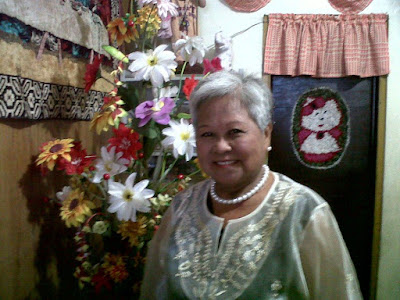My mother is a
member of the Senorito and Senorita Class in Makati (referring to Senior
citizens). Every year, they are getting
allowance from the City Government of Makati and a birthday cake, too. Our senior citizens are also enjoying free
spa, free movies, participation in recreational and cultural activities for
free like ballroom dancing, opera watching, among others. The local government has been providing free
medicines and hospitalization to its bona
fide senior citizens even prior to enactment of the Expanded Senior
Citizens Act. These are only premium to Makati’s senorito and senoritas aside
from enjoying 20% discount in primary commodities, medicine and restaurants.
Under RA 9994, otherwise
known as the “Expanded Senior Citizens Act of 2010”, rights and privileges
of senior citizens all over the country now include:
1. Twenty
percent (20%) discount and exemption from the Value-Added Tax
(VAT), if applicable, on the sale of the following goods and services from all
establishments, for the exclusive use and enjoyment or availment of the senior
citizen:
a. Purchase of medicines, including the purchase
of influenza and pnuemococcal vaccines, and such other essential medical supplies,
accessories and equipment to be determined by the Department of Health (DOH);
b. On
the professional fees of attending physician/s in all private hospitals,
medical facilities, outpatient clinics and home health care services;
c. On
the professional fees of licensed professional health providing home health
care services as endorsed by private hospitals or employed through home health
care employment agencies;
d. On
medical and dental services, diagnostic and laboratory fees in all private
hospitals, medical facilities, outpatient clinics, and home health care
services;
e. In
actual fare for land transportation travel in public utility buses (PUBs),
public utility jeepneys (PUJs), taxis, Asian utility vehicles (AUVs), shuttle
services and public railways, including Light Rail Transit (LRT), Mass Rail
Transit (MRT), and Philippine National Railways (PNR);
f. In actual transportation fare for
domestic air transport services and sea shipping vessels and the like, based on
the actual fare and advanced booking;
g. On
the utilization of services in hotels and similar lodging establishments,
restaurants and recreation centers;
h. On
admission fees charged by theaters, cinema houses and concert halls, circuses,
leisure and amusement; and
i. On funeral and burial services for
the death of senior citizens;
2. Exemption
from the payment of individual income taxes of senior citizens who are
considered to be minimum wage earners in accordance with Republic Act No. 9504;
3. Five percent (5%) discount relative to the
monthly utilization of water and electricity supplied by the public utilities. (Provided,
1. That the individual meters for the foregoing utilities are registered in the
name of the senior citizen residing therein; 2. the monthly consumption does
not exceed one hundred kilowatt hours (100 kWh) of electricity and thirty cubic
meters (30 m3) of water) This privilege is granted per household
regardless of the number of senior citizens residing therein;
4. Exemption
from training fees for socioeconomic programs;
5. Free
medical and dental services, diagnostic and laboratory fees such as, but not
limited to, x-rays, computerized tomography scans and blood tests, in all
government facilities, subject to the guidelines to be issued by the DOH in coordination
with the PhilHealth;
6. The
DOH shall administer free vaccination against the influenza virus and
pneumococcal disease for indigent senior citizen patients;
7. Educational
assistance to senior citizens to pursue pot secondary, tertiary, post tertiary,
vocational and technical education, as well as short-term courses for retooling
in both public and private schools through provision of scholarships, grants,
financial aids, subsides and other incentives to qualified senior citizens,
including support for books, learning materials, and uniform allowances, to the
extent feasible. (The senior citizen shall meet minimum admission requirements);
8. The
continuance of the same benefits and privileges given by the Government Service
Insurance System (GSIS), the Social Security System (SSS) and the PAG-IBIG, as
the case may be, as are enjoyed by those in actual service;
9. Retirement
benefits of retirees from both the government and the private sector shall be
regularly reviewed to ensure their continuing responsiveness and sustainability,
and to the extent practicable and feasible, shall be upgraded to be at par with
the current scale enjoyed by those in actual service;
10. Grant of special discounts in
special programs for senior citizens on purchase of basic commodities, subject
to the guidelines to be issued for the purpose by the Department of Trade and
Industry (DTI) and the Department of Agriculture (DA);
11. Provision of express lanes for
senior citizens in all commercial and government establishments, in the absence
thereof, priority shall be given to them; and
12. Death benefit assistance of a
minimum of Two thousand pesos (Php2, 000.00) shall be given to the nearest
surviving relative of a deceased senior citizen which amount shall be subject
to adjustments due to inflation in accordance with the guidelines to be issued
by the DSWD.
To
avail the foregoing privileges, the Senior Citizen or his/her duly authorized
representative, may submit as proof of his/her entitlement, any of the
following:
a. Senior
Citizen Identification Card issued by the Office of the Senior Citizen Affairs
(OSCA) of the place where the senior citizen resides (which shall be honored
nationwide);
b. The
passport of the senior citizen concerned;
c. Other
documents that will establish that the senior citizen is a citizen of the
Republic and is at least sixty (60) years of age.
Aside from those
mentioned, priority in service and parking spaces in establishments are also given to senior citizens.


